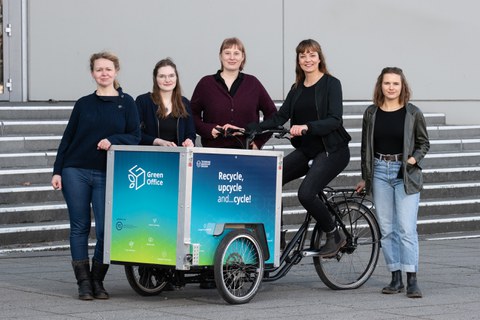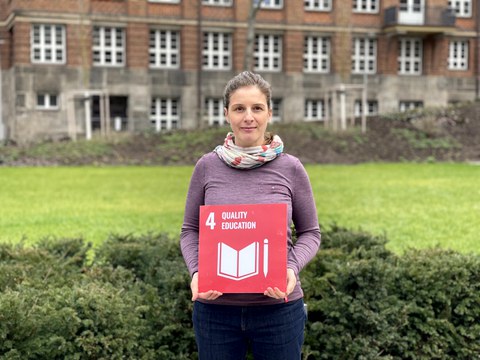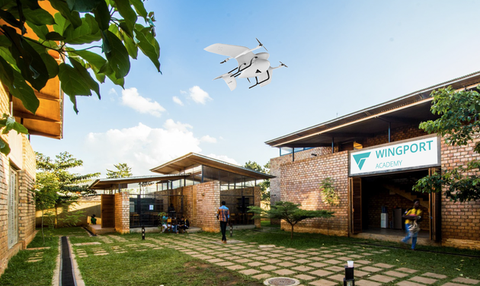Courses & Good Practice
At TU Dresden, some courses are already offered regularly in the fields of environmental education and education for sustainable development (ESD). Here, you can find a selection of specific courses and programs that are open to students and other interested individuals. These courses can typically be taken as part of the Studium Generale. Credit is awarded on a case-by-case basis by the responsible Examination Committee. In any case, the courses may be audited for no credit, if desired.
SustainAbility: Understanding and Implementing Sustainability
Kristin Fiedler, Valerie Uhlig and Marie Zweifel are involved in the SustainAbility: Understanding and Implementing Sustainability event series, serving the SDG 4 goals:
What is the project about?
SustainAbility: Understanding and Implementing Sustainability is a student-run environmental education format created to educate people with little prior knowledge about climate change and its causes and effects, and to present possible solutions.
Our main aim is to achieve Objective 4.7, to ensure that all learners acquire the necessary knowledge and skills to promote sustainable development. Our series of events will enable different target groups, from young to old, to access relevant information on climate protection and sustainability, both locally and digitally. We attach particular importance to providing an environmental education programme that is as low-threshold and barrier-free as possible for all interested parties. In this way, we want to provide inclusive and equal education and promote lifelong learning. Our offers are free of charge and can, for example, be used by other teachers as freely accessible educational materials. In this way, we want to provide inclusive and equal education and promote lifelong learning. Our offers are free of charge and can, for example, be used by other teachers as freely accessible educational materials. In this way, we strengthen the qualification of multipliers in the field of education for sustainable development in order to increase the range of knowledge. In addition to providing information, we also invite participants to engage in discussion and active engagement against climate change and network them with various practical actors in urban society.
Which word best describes your project in relation to SDG 4?
Education
Main information
- Provider:in: Green Office & university group "Basic Lecture on Ecological Sustainability
- Implementation period: every semester
- Content: Opportunity to deal with ecological sustainability from different perspectives
- Time/room: Thursdays, 16.40 - 18.10 in the HSZ and online
- Further information: here
- Creditable in studium generale and studium oecologicum
Future ambassadors
Ines Röhrborn and Dr. Volker Kreß from the Center for Teacher Training and Educational Research (ZLSB) are part of the Future Ambassadors Project and focus on SDG 4 “Quality Education.”
What is it about?
Our Future Ambassadors Project is a one semester, supplementary course aimed at future teachers -regardless of the type of school or chosen subject. In this course, participants train and develop skills that will become increasingly important in their future - in a world that can be described using the terms volatility, uncertainty, complexity and ambiguity.
As schools are places of activity that prepare young people for the challenges of the future and equip them with the necessary knowledge, we need teachers who are capable of conveying that expertise.
Our future ambassadors should therefore test methods and techniques with which they can inspire not only their students, but also their colleagues in the schools, to make the necessary changes in their habits, transform institutions and society as a whole.
ZLSB engages in numerous projects which target all of the subgoals of SDG 4: “Quality Education.”
Our course primarily offers a pragmatic approach to the didactics of education for sustainable development. Participants will experience and reflect upon aspects such as collaboration, communication, creativity, dealing with gaps in knowledge and change management when approaching everyday challenges.
What word best describes this project that focuses on SDG 4?
Agent of change
Educational farmland (BildungsAcker)
Prof. Nicole Raschke from the Chair of Geographical Education introduces her education for sustainable development (BNE) project entitled “Educational Farmland” (Bildungsacker)
What is the project about?
TU Dresden’s project “Educational Farmland” (Bildungsacker) incorporates a tangible element to education for sustainable development for future teachers. By offering an explorative, action-oriented approach, the project seminar links individual experience with self-efficacy in the cultivation of educational farmland. This is achieved with theoretical, reflective practices, which allow the participants to transfer their knowledge gained at the "educational farmland" to their own approaches and concepts for transformative learning opportunities, for example when planning their own lessons or school projects. In this way, the educational farmland is a cross-sectional venture in line with the demands of education for sustainable development, offering pedagogical approaches that focus on experience and reflection.
Series of lectures on the environment
Klara-Johanna Fabisch from the TU Environmental Initiative (TUUWI) introduces her education for sustainable development (BNE) project:
What is it about?
At TU Dresden, we offer a range of courses for students by students. In each semester, there are two series of lectures on the environment and two project days organized by the students themselves. You are very welcome to participate and, once you have earned eight credits, you will be awarded a Studium Oecologicum. This is a special certificate that you can add to your graduation certificate. It shows that you have studied topics related to environmental sustainability. We would be delighted for you to pay us a visit and participate in a lecture on the environment.
Climate Heroes
Marie Zweifel works at the Central point of contact for schools at TU Dresden and is involved in the Climate Heroes Project:
What is the project about?
In the new project entitled “Climate Heroes” of the central point of contact for schools, pupils have the opportunity to talk to researchers at TU Dresden about sustainability and environmental protection within their own living space. The aim is to create a space where young people can develop and reflect on their ideas for action, and also assess the impact of these ideas. By networking with like-minded individuals, the participants are also encouraged to actively stand up for a more sustainable future and are given ideas to implement in their own lives.
The pupils discuss challenges in the context of climate change, contribute their personal experiences and come up with possible solutions that could be implemented in their living space. They are supported by researchers who, in addition to their technical expertise, also contribute personal experience from their professional careers. No matter if the topic is energy consumption at school or on the way there - collecting and analyzing data is the basis of the discussion.
Service Learning "reflect.engage - doing sustainability"
What is the project about?
Every year, we organize a BNE project entitled “reflect.engage - doing sustainability.” Here, students involved in any degree program have the opportunity to experience sustainability in a practical way, to organize and conceptualize projects, and to learn how to inspire others with regard to the topic of sustainability. The students implement a practical project on campus over the course of one semester. This could entail, e.g. The planning of a project week for a car-friendly campus, the conception or organization of a course on the topic of sustainability or projects to increase biodiversity on campus, etc.
What word best describes this project that focuses on SDG 4?
Get involved
Continuing education in the education for sustainable development working group
Kathrin Müller works at the Center for Continuing Education (ZfW) and is an active participant in the education for sustainable development working group of the Environment Commission
What is the project about?
At the ZfW, I am the in charge of the internal continuing education program for staff of TU Dresden.
Why am I involved in the education for sustainable development working group (of the Environment Commission)?
I am convinced that the topics of sustainability and educational justice are extremely important for all of us and that we need education, experience, reflection and exchange to effect solid change. The working group organizes events with this in mind. We can learn new things together, exchange ideas, as well as discuss and hear a number of different perspectives on the topics.
You are cordially invited to bring your enthusiasm and creativity to our working group. We are very much looking forward to welcoming new members, no matter if you are involved in teaching, administration, research or if you are studying at TU Dresden.
Courses
- Held by: Chair of Technical Design
- Held every summer semester
- Content: Draft of a product-service system from analysis to planning and draft to digital or hybrid presentation of the design solution
- Time / location:
- Detailed information: here
- Eligible for credit in the studium generale and Studium Oecologicum
- Held by: Centre for Interdisciplinary Learning and Teaching (ZiLL), Dr. Sylvia Maus, LL.M. & Dr. Martin Gerner, MBA
- Time frame: October 10, 2022 to February 28, 2023
- Content: Theoretical and conceptual background information on volunteer and civic involvement, service learning (= transfer between science and society), sustainability terminology, insights into different opportunities for sustainability-based involvement, facilitation of involvement in specific contexts, proposal of an analysis on involvement strategies, reflection on experiences, preparation of a professional presentation of own experiences
- Time / location: Mondays, 4:30–7:45 pm / Tharandt, Dresden, online (regardless of course time)
- OPAL course: here
- Eligible for credit in the studium generale and Studium Oecologicum
- Held by: Faculty of Business and Economics
- Time frame: Various programs starting either in the summer or winter semester
- Content: School pupils’ experiments on resources, infrastructure, etc., courses for university students on energy economics, production and logistics, economics, management and organization as well as sustainability management
- Time / location: differs for each course
- Detailed information: here, video on the topic here
Certificates
Studium Oecologicum
Studium Oecologicum is a certificate program that complements students’ normal course of studies, affording them key competencies and basic knowledge of the relationship between humans and the environment as well as issues of sustainable development.
Prerequisite: You must have at least 8 ECTS points in at least four courses offered by the TU Environmental Initiative (tuuwi) or other Studium Generale courses (you can find the directory here) which directly pertain to the topics above or are comparable.
Of these courses, at least one should be a tuuwi course.
Courses that are meant to make up a compulsory module in your degree program will not be credited toward the Studium Oecologicum, even if they touch upon the above-mentioned topics. You can apply for the certificate up to a maximum of six months after completing your Bacherlor’s, Master’s or Diplom degree program.
How do you obtain your certificate? By collecting, scanning and submitting all relevant documents proving your attendance and examination to urv@tuuwi.de. Then, the certificate will be issued.
- Proof of attendance of a TU Environmental Initiative course (e.g. an environmental lecture series or project day): 1 ECTS point
- Proof of examination in a TU Environmental Initiative course (e.g. an environmental lecture series with examination and proof of passing grade): 3 ECTS points
- Proof of attendance and examination in a course from the Studium Generale: Credit possible upon written request (on a case-by-case basis).
Of course, tuuwi and Studium Generale courses may also be combined for credit toward a Studium Oecologicum certificate.









